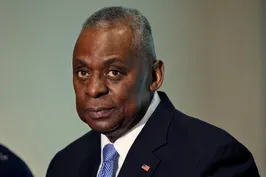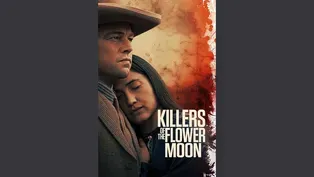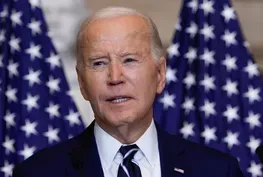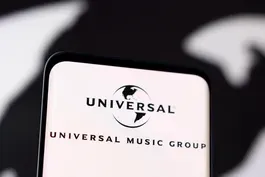
Affordable Care Act battle threatens coverage for millions
Clip: 2/1/2024 | 8m 18sVideo has Closed Captions
Another election year battle over Affordable Care Act threatens coverage for millions
The number of Americans getting health insurance through the Affordable Care Act has hit a record high with more than 21 million people signed up through the marketplaces. As it has in the past, the law known as Obamacare is becoming an election issue. We hear from people who currently get insurance through ACA and William Brangham discusses what’s at stake with Sabrina Corlette.
Problems with Closed Captions? Closed Captioning Feedback
Problems with Closed Captions? Closed Captioning Feedback
Major corporate funding for the PBS News Hour is provided by BDO, BNSF, Consumer Cellular, American Cruise Lines, and Raymond James. Funding for the PBS NewsHour Weekend is provided by...

Affordable Care Act battle threatens coverage for millions
Clip: 2/1/2024 | 8m 18sVideo has Closed Captions
The number of Americans getting health insurance through the Affordable Care Act has hit a record high with more than 21 million people signed up through the marketplaces. As it has in the past, the law known as Obamacare is becoming an election issue. We hear from people who currently get insurance through ACA and William Brangham discusses what’s at stake with Sabrina Corlette.
Problems with Closed Captions? Closed Captioning Feedback
How to Watch PBS News Hour
PBS News Hour is available to stream on pbs.org and the free PBS App, available on iPhone, Apple TV, Android TV, Android smartphones, Amazon Fire TV, Amazon Fire Tablet, Roku, Samsung Smart TV, and Vizio.
Providing Support for PBS.org
Learn Moreabout PBS online sponsorshipWILLIAM BRANGHAM: The number of Americans getting health insurance through the Affordable Care Act has hit a record high, with more than 21 million people signed up through the marketplaces.
But as it has in the past, this law, often referred to as Obamacare, is becoming an election issue.
In a moment, I will have a conversation about what's at stake, but, first, let's hear from people who currently get their insurance through this law.
KENNITA HICKMAN, Affordable Care Act Enrollee: Having access to ACA as an entrepreneur has been everything.
I don't know what I would do if I didn't have access to it.
How would I -- how would I go to those annual visits for my specialists just to make sure that I'm OK?
And how would I be able to do it at an affordable price?
I'm two-and-a-half years into being a full-time entrepreneur.
I'm not making a lot of money.
And so, I mean, it's scary to think about stipends going away, because those stipends, even when I worked at a full-time company in 2017, they were everything.
They were so helpful.
CHRIS MCMAHON, Affordable Care Act Enrollee: I definitely need ACA.
Financially, it's a great resource for me.
I mean, with the diabetes, it's a tough thing.
So, it helps me through that.
And if that wasn't an option, it would be difficult for me.
It's pretty much this or no insurance or returning to the work force, which kind of isn't an option for me right now.
HOLLY GOEBEL, Affordable Care Act Enrollee: We decided we needed to sign-up because my husband was laid off from his job, where we get employee-provided insurance.
And we did not want to risk having several months without insurance.
The Affordable Care Act, while it's giving me health insurance and it's giving me a tax credit for my family so it's more affordable, it's not nearly as good as I would like it to be.
I do have lots of fears in the coming year or several years as we're looking at a presidential election and other situations that are going to occur in our House and Senate and how that can impact the Affordable Care Act.
I am fearful that if this program goes away, I don't know that we can come up with a better solution.
While this isn't perfect, it makes life a little less stressful for those of us with chronic illnesses.
WILLIAM BRANGHAM: The Biden administration and Congress have provided increasing subsidies to help people like those we just heard from by this insurance, and they have worked to increase those enrollment numbers.
But on the campaign trail, former President Trump has said once again he would try to replace the law if he was elected.
For more on all of this, I spoke earlier today with Sabrina Corlette.
She is founder and co-director of the Center on Health Insurance Reforms at Georgetown University's McCourt School of Public Policy.
Sabrina, welcome back to the "NewsHour."
SABRINA CORLETTE, Center on Health Insurance Reforms, Georgetown University: Thank you.
WILLIAM BRANGHAM: Five million more people are on the Affordable Care Act's health insurance policies than they were a year ago.
What is driving that surge?
SABRINA CORLETTE: Well, a few things.
Number one, the Biden administration has made big investments, First of all, to enhance the premium tax credits that are available to help people buy the coverage.
The second thing they have done is increase funding for outreach and consumer assistance so that more people are aware that the subsidies are available.
And then, once they go to sign up, they're helped along the process as they fill out the applications.
The third thing that's going on is the states are starting to what we call unwind Medicaid enrollment.
So, during the COVID-19 pandemic, Congress required states to keep people on Medicaid for about three years.
Now states are starting to go through the Medicaid renewal processes, and folks who are no longer eligible for Medicaid because their income is a little bit too high are now eligible for the marketplace plans.
WILLIAM BRANGHAM: I see.
So the subsidies that people are offered to help buy that insurance, that doesn't last forever, right?
People's premiums do eventually start to creep back up.
SABRINA CORLETTE: Well, it depends on your income.
So the way Obamacare works is your -- the amount you pay in premium is capped based on your income level.
So the lower your income, the less you pay in premiums.
If your income goes up, then the amount you are expected to pay in premium will go up.
WILLIAM BRANGHAM: I see.
I mentioned how this is likely going to be an issue in the presidential race.
Can you just remind us, how pivotal will the 2024 election be with regards to this law?
SABRINA CORLETTE: Well, we have one presidential candidate, most likely, who is pledged to build on and improve the Affordable Care Act.
That's President Biden.
And then we have another potential presidential candidate in Trump who's pledged to repeal it.
So it's not clear what he would do if he were successful in that effort.
And, obviously, we don't know what Congress will look like if he's elected.
But I do think that, should a repeal effort be successful, we're looking at a lot of people who could very abruptly lose their health insurance coverage.
WILLIAM BRANGHAM: I wonder if you think that the political salience of attacking the Affordable Care Act is as potent as it might have been a decade or so ago.
I mean, it seems like the more people you get onto the program, the more sort of individual champions you have for it.
SABRINA CORLETTE: Right.
When Trump came into office in 2017, there were about 12 million people enrolled in the marketplaces.
Now we have 21 million people who have signed up.
WILLIAM BRANGHAM: That's a lot more voters.
SABRINA CORLETTE: So it's a lot more people.
And I also think that we have had this law in place for over 10 years now.
It's just part of the fabric of our health care system.
So it's hard to imagine what -- how provider systems would work without Obamacare, how coverage would work without Obamacare.
It's really just become sort of intertwined and sort of part of the fabric of health care in the U.S. WILLIAM BRANGHAM: I mean, that's one of the criticisms that people who criticized the Affordable Care Act at the beginning were.
They always said, if you allow this to start and people start to enroll, they will like it and then it's impossible to -- it's like a dragon that you can't kill once it's birthed and out in the world.
(LAUGHTER) SABRINA CORLETTE: Yes.
I think that the coverage is not perfect.
Sometimes, there are difficulties accessing certain providers, but it provides really meaningful financial protection if you get sick.
It provides free access to preventive care and access to really critical primary care.
So particularly if you have any kind of preexisting condition, diabetes or a heart issue, the law is really, I mean, sort of essential to your ability to interact with the health care system.
WILLIAM BRANGHAM: Do we know how much - - one of the criticisms of all of this that the conservatives will make about these subsidies in particular is that they're too costly for the quality of care that people are getting.
Is there any way to do a cost/benefit analysis to know that we are as a government spending this much, yielding this much benefit?
SABRINA CORLETTE: Well, it's funny.
I think there's this common misperception that people who have employer-based coverage are not subsidized by the federal government.
In fact, employer-based insurance is the most heavily subsidized coverage that we have got.
So there's -- it's just a different form, right?
So, with the Affordable Care Act, we have premium tax credits.
With employer-based coverage, it's a tax exclusion.
But, either way, the federal government is subsidizing essentially all of us who have any kind of insurance.
WILLIAM BRANGHAM: Sabrina Corlette of Georgetown University, thank you so much for being here.
SABRINA CORLETTE: My pleasure.
Austin apologizes for failing to disclose cancer battle
Video has Closed Captions
Austin apologizes for failing to tell White House about his cancer and hospitalization (4m 15s)
Dozens of swatting calls target members of Congress
Video has Closed Captions
Dozens of swatting calls target members of Congress and candidates on campaign trail (6m 21s)
Lily Gladstone on her historic Oscar nomination
Video has Closed Captions
Lily Gladstone on her historic Oscar nomination for 'Killers of the Flower Moon' (7m 51s)
News Wrap: U.S. sanctions Israelis accused in attacks
Video has Closed Captions
News Wrap: Biden sanctions Israeli settlers in West Bank accused of attacking Palestinians (4m 4s)
Russian politician discusses publicly denouncing Ukraine war
Video has Closed Captions
Russian politician denounces Ukraine war, wants to be 'free from Putin's shackles' (5m 46s)
What is Christian nationalism and why it raises concerns
Video has Closed Captions
What is Christian nationalism and why it raises concerns about threats to democracy (7m 17s)
Why Universal Music Group is pulling songs from TikTok
Video has Closed Captions
Why Universal Music Group is pulling songs from TikTok (8m 20s)
Providing Support for PBS.org
Learn Moreabout PBS online sponsorshipSupport for PBS provided by:
Major corporate funding for the PBS News Hour is provided by BDO, BNSF, Consumer Cellular, American Cruise Lines, and Raymond James. Funding for the PBS NewsHour Weekend is provided by...


















